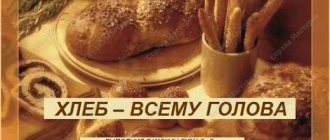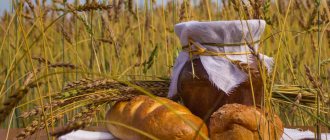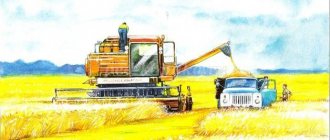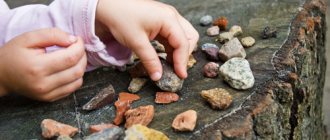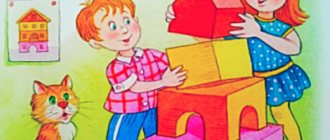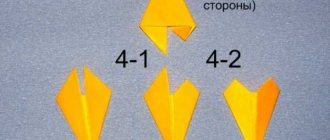"The Girl Who Stepped on Bread"
A child should read the fairy tale by G.Kh. Andersen about a poor but proud girl who loved to torture insects. When she began to serve in the landowner's house, the owners reminded her that she needed to visit her parents. She went. But when she saw her mother with a bundle of brushwood, she felt ashamed that she was so ragged. And Inge left without seeing her mother.
Six months later she was again reminded of her mother. She took the white bread they gave her and went. She was dressed in a beautiful dress and had new shoes. When she encountered a dirty puddle, she threw bread at her feet and then stepped on it. And suddenly she began to be pulled into the ground. That's how she ended up with the swamp woman.
Where the swamp woman lived was a very dirty place. The devil and a poisonous old woman came to visit her, and Inge really liked her. She wanted to make an idol out of her. The girl, having gone to hell, saw the torment of sinners. And her torment was just beginning. She was hungry and wanted to break off some bread, but she could not move. She petrified, turned into an idol. Then she felt hot tears dripping onto her. It was her mother crying. Everyone on earth already knew about her sin. People even composed a song about a arrogant girl who stepped on bread.
Inge has only heard bad things about herself. But still, one little girl, having heard the story about her, felt sorry for her. The little one really wanted Inge to ask for forgiveness. The girl called her poor and was very sorry.
Everyone has already died: the mother, the mistress for whom Inge worked. The girl who thought about Inga also became old. And Inge thought about the fact that a stranger loved her and cried for her. She cried, and her stone shell melted. The girl turned into a bird.
Since then she has been flying and collecting crumbs. She eats only one, and then calls other birds. She gave away as many crumbs as there were in the bread she stepped on.
PLOWING
We stir up memories of the past less and less now And at the dinner table We don’t divide the bread, but simply cut it, Moreover, forgetting about the knife that is not sharp, We grumble that the bread is a little stale, And we ourselves, perhaps at this hour, are many times staleer than it. It is impossible to imagine the life of a modern person, who can prepare many different dishes for himself, without bread. Bread is the head of everything. How did our ancestors manage without bread? And when did they learn to bake it? Already in the Stone Age, people noticed that the grains of some plants are very filling, and, unlike fruits and mushrooms, they do not spoil for a long time. These plants are wild cereals: rye, wheat, barley. Tribes of primitive gatherers settled near fields of wild cereals. They cut off the mature ears of corn with stone sickles. Gradually, people invented various tools with which they cultivated the land, harvested grain, and ground flour. Preparing land for sowing is hard work. In ancient times, in most parts of Rus', powerful, impassable forests grew. The peasants had to uproot trees and free the soil from roots. Even flat areas near rivers were not easy to cultivate for sowing.
“The earth is compacted: it is never turned, it is dead, because there is no access to air, and plants cannot live without air... everyone needs air to breathe. To give life to the earth, you need to turn it outward, you need to open access to air, that is, break it up, crush it” (S. V. Maksimov). In order for the land to “come to life”, it was necessary to plow it, and more than once: first in the fall, then in the spring before sowing. In those ancient times they plowed plows or roe deer. These are simple tools that every peasant could make himself. Later the plow appeared, although it did not completely replace the plow. The peasant decided what to plow. It depended on the soil. The plow was more often used on heavy fertile soils. Unlike the plow, the plow not only cut the layer of earth, but also turned it over. After the field is plowed, it needs to be “combed.” They did this with the help of this tool: “A sieve with four corners, five heels, fifty rods, twenty-five arrows.” This is a harrow. Sometimes a spruce log with a large number of long knots was used as a harrow. A “modernized” harrow is a grid of four bars to which wooden or iron teeth are attached. When harrowing, all clods were broken and pebbles were removed. The soil became loose, ready for sowing. RIDDLES, PROVERBS AND SAYINGS Baba Yaga, with a pitchfork, feeds the whole world, she herself is hungry. (Sokha) Walks in the field from end to end, cutting a black loaf. (Plow) * * * • If you sow at the right time, you will reap a mountain of grain. • It’s better to go hungry and sow good seed. • Place manure thickly, so the barn will not be empty. • The owner of the earth is not the one who wanders through it, but the one who walks with a plow. • There is no time to lie down when it’s time to reap. • Aches in the back, but there is bread on the table.
"A piece of bread"
A. Nuikin’s story “A Piece of Bread” will help a child understand a lot about the importance of bread. It describes a case of a piece of bread lying on the sidewalk. People walked by: young, old, children. One boy took a piece and kicked it into the middle of the road. Suddenly he heard someone say about sin. I looked around and saw an old man. He looked left and right and quietly walked towards the piece. Then he carried it to the lawn with the hope of feeding the birds.
The old man stood and thought about his hungry childhood, when even for the holiday his mother mixed grass or seeds into the flour. She worked alone, and there were eight hungry people.
This old man knew the times of famine, he knows how bread was obtained. Picking up a piece of bread, he mentally bowed to the hard work of the people who grow it, and to the calloused hands of the grain grower. For an old man, bread is a sacred thing, which he will always treat with care. And he wants everyone, including the younger generation, to value bread in the same way.
Fairy tale Light bread - read online
The mower settled in the meadow. I got tired and sat down under a bush to rest. He took out the bag, untied it and began to chew the bread. A hungry wolf comes out of the forest. He sees a mower sitting under a bush and eating something. The wolf approached him and asked:
- What are you eating, man? “Bread,” the mower answers. - Is it tasty? - And how delicious it is! - Let me taste it. - Well, try it.
The mower broke off a piece of bread and gave it to the wolf.
The wolf liked the bread. He says: “I would like to eat bread every day, but where can I get it?” Tell me, man! “Okay,” says the mower, “I’ll teach you where and how to get bread.”
And he began to teach the wolf: “First of all, you need to plow the land...” “Then there will be bread?” - No, brother, wait. Then you need to harrow the ground... - And can you eat bread? - The wolf waved his tail. - What are you saying, wait a minute. First you need to sow rye... - Then there will be bread? - the wolf licked his lips.
- Not yet. Wait until the rye sprouts, survives the cold winter, grows in the spring, then blooms, then begins to spike, then ripens... “Oh,” the wolf sighed, “however, we have to wait for a long time!” But then I’ll eat plenty of bread!.. - Where can you eat! - the mower interrupted him. - It's too early. First you need to squeeze the ripe rye, then tie it into sheaves, put the sheaves in heaps. The wind will blow them away, the sun will dry them, then take them to the current...
- And will I eat bread? - Eh, so impatient! You must first thresh the sheaves, pour the grain into bags, take the bags to the mill and grind the flour...
- That's all? - No, not all. You need to knead the flour in the bowl and wait for the dough to rise. Then place it in a hot oven. - And will the bread be baked? - Yes, the bread will be baked. “That’s when you’ll eat it,” the mower finished his lecture.
The wolf thought for a moment, scratched the back of his head with his paw and said: “No!” This work is painfully long and hard. Better advise me, man, how to get food easier. “Well,” says the mower, “since you don’t want to eat heavy bread, eat light bread.” Go to the pasture, the horse is grazing there.
The wolf came to the pasture. I saw a horse. - Horse, horse! I will eat you. “Well,” says the horse, “eat.” Just take the horseshoes off my feet first, so as not to break your teeth on them. “And that’s true,” the wolf agreed. He bent down to take off the horseshoes, and the horse hit him in the teeth with its hoof... The wolf somersaulted and ran.
He ran to the river. He sees geese grazing on the shore. “Should I eat them?” -thinks. Then he says:
- Geese, geese! I'll eat you. “Well,” the geese answer, “eat.” But first, do us one favor before you die. - Which one? - Sing to us, and we will listen. - It's possible. I am a master of singing. The wolf sat down on a hummock, raised his head and began to howl. And the geese, flapping and flapping their wings, rose up and flew away. The wolf got down from the hummock, looked after the geese and went away empty-handed.
He goes and scolds himself with the last words: “What a fool I am! Why did you agree to sing? Well, now I’ll eat whoever I meet!” Just when he thought so, lo and behold, an old grandfather was walking along the road. The wolf ran up to him: “Grandfather, grandfather, I will eat you!” - And why is it in such a hurry? - says Del. - Let's smell the tobacco first. - Is it tasty? - Try it and you'll find out. - Let's. The grandfather took a tobacco pouch out of his pocket, sniffed it himself and gave it to the wolf. As the wolf sniffed with all his might, he inhaled the entire pouch of tobacco. And then he started sneezing all over the forest... He can’t see anything because of his tears, he keeps sneezing. He sneezed like this for an hour until all the tobacco was sneezed out. I looked around, and there was no trace of my grandfather.
The wolf moved on. He walks, walks, and sees a flock of sheep grazing in a field, and the shepherd is sleeping. The wolf spotted the best ram in the herd, grabbed it and said: - Ram, ram, I will eat you! “Well,” says the ram, “this is my lot.” But so that you don’t suffer for a long time and don’t break your teeth on my old bones, you better stand in that hollow over there and open your mouth, and I’ll run up the hill, accelerate and draw you into my mouth.
“Thanks for the advice,” says the wolf. - That's what we'll do. He stood in the hollow, opened his mouth and waited. And the ram ran up the hill, sped up and hit the wolf on the head with its horns. So sparks fell from the gray one’s eyes, and the whole light began to spin in front of him!
The wolf came to his senses, turned his head and reasoned with himself: “Did I eat it or not?” Meanwhile, the mower has finished his work and goes home. He heard the wolf’s words and said: “I didn’t eat anything, but I did taste some light bread.” That's the end of the fairy tale, and whoever listened - well done!
dobrye-skazki.ru
"Bread Flower"
Yu. Yakovlev writes about the great value of bread in times of famine in the story “The Flower of Bread.” The boy Kolya felt hungry all the time. He ate everything that was edible. It was a hungry post-war time.
When grandma baked two fragrant wheat loaves, Kolya couldn’t get enough of them. In his imagination, they were like suns that smiled at him. He inhaled the smell of the cakes with pleasure, broke off a piece and dreamed that good times would come. He will eat these cakes every day for breakfast, lunch and dinner. This was the greatest happiness in his future life.
Then he took the loaf to his grandfather to the apiary. He himself had already eaten, but when he came to his grandfather, it seemed to him that his grandfather should share the loaf with him. But my grandfather did not do this. Kolya thought that his grandfather was being greedy. It turns out that the grandfather put the loaf back in the boy’s bag and sent him home. Arriving home, Kolya saw the loaf and was overwhelmed with joy. He realized that his grandfather was not greedy, but caring. He thought about his grandmother and grandson, and he ate bee water. She quenched her hunger. Kolya loved and respected his grandfather and also wanted his grandfather to try the delicious loaf. The boy wrapped it in a rag and put it in his grandfather's chest in the hope that his grandfather would return from the apiary, treat himself to bread and feel great joy from the satiety of bread. This is the “journey” made by the loaf of the post-war period. In those years, bread was the greatest value.
Russian folk tale, read text online
Russian folk tale “Light Bread” read the text online:
A mower was mowing the meadow. I got tired and sat down under a bush to rest. He took out the bag, untied it and began to chew the bread.
A hungry wolf comes out of the forest. He sees a mower sitting under a bush and eating something. The wolf approached him and asked:
- What are you eating, man? “Bread,” the mower answers. - Is it tasty? - And how delicious it is! - Let me taste it. - Well, try it.
The mower broke off a piece of bread and gave it to the wolf.
The wolf liked the bread. He says:
– I would like to eat bread every day, but where can I get it? Tell me, man! “Okay,” says the mower, “I’ll teach you where and how to get bread.”
And he began to teach the wolf:
- First of all, we need to plow the land... - Then there will be bread? - No, brother, wait. Then you need to harrow the ground... - And can you eat bread? – the wolf waved his tail. - What are you saying, wait a minute. First you need to sow rye... - Then there will be bread? – the wolf licked his lips. - Not yet. Wait until the rye sprouts, survives the cold winter, grows in the spring, then blooms, then begins to spike, then ripens... “Oh,” the wolf sighed, “however, we have to wait for a long time!” But then I’ll eat plenty of bread!.. - Where can you eat! - the mower interrupted him. - It's too early. First you need to squeeze the ripe rye, then tie it into sheaves, put the sheaves in heaps. The wind will blow them away, the sun will dry them, then take them to the current... - And will I eat bread? - Eh, so impatient! First you need to thresh the sheaves, pour the grain into bags, take the bags to the mill and grind the flour... - That's all? - No, not all. You need to knead the flour in the bowl and wait for the dough to rise. Then place it in a hot oven. - And will the bread be baked? - Yes, the bread will be baked. “That’s when you’ll eat it,” the mower finished his lecture.
The wolf thought, scratched the back of his head with his paw and said:
- No! This work is painfully long and hard. Better advise me, man, how to get food easier. “Well,” says the mower, “if you don’t want to eat heavy bread, eat light bread.” Go to the pasture, the horse is grazing there.
The wolf came to the pasture. I saw a horse.
- Horse, horse! I will eat you. “Well,” says the horse, “eat.” Just take the horseshoes off my feet first, so as not to break your teeth on them. “And that’s true,” the wolf agreed. He bent down to take off the horseshoes, and the horse hit him in the teeth with its hoof... The wolf somersaulted and ran.
He ran to the river. He sees geese grazing on the shore. “Should I eat them?” - thinks. Then he says:
- Geese, geese! I'll eat you. “Well,” the geese answer, “eat.” But first, do us one favor before you die. -Which one? – Sing to us, and we will listen. - It's possible. I am a master of singing.
The wolf sat down on a hummock, raised his head and began to howl. And the geese flapped their wings, flapped - they rose and flew.
The wolf got down from the hummock, looked after the geese and went away empty-handed.
He goes and scolds himself with the last words: “What a fool I am! Why did you agree to sing? Well, now I’ll eat whoever I meet!”
Just when he thought so, lo and behold, an old grandfather was walking along the road. The wolf ran up to him:
- Grandfather, grandfather, I will eat you! - And why is it in such a hurry? - says Del. - Let's smell the tobacco first. - Is it tasty? – Try it and you’ll find out. - Let's.
The grandfather took a tobacco pouch out of his pocket, sniffed it himself and gave it to the wolf. As the wolf sniffed with all his might, he inhaled the entire pouch of tobacco. And then he started sneezing all over the forest... He can’t see anything because of his tears, he keeps sneezing. He sneezed like this for an hour until all the tobacco was sneezed out. I looked around, and there was no trace of my grandfather.
The wolf moved on. He walks, walks, and sees a flock of sheep grazing in a field, and the shepherd is sleeping. The wolf spotted the best ram in the herd, grabbed it and said:
- Ram, ram, I will eat you! “Well,” says the ram, “this is my lot.” But so that you don’t suffer for a long time and don’t break your teeth on my old bones, you better stand in that hollow over there and open your mouth, and I’ll run up the hill, accelerate and draw you into my mouth. “Thanks for the advice,” says the wolf. - That's what we'll do.
He stood in the hollow, opened his mouth and waited. And the ram ran up the hill, sped up and hit the wolf on the head with its horns. So sparks fell from the gray one’s eyes, and the whole light began to spin in front of him!
The wolf came to his senses, shook his head and reasoned with himself:
– Did I eat it or not?
Meanwhile, the mower has finished his work and goes home. He heard the wolf's words and said:
“I didn’t eat anything, but I did taste some light bread.”
Share link:
skazki-dlja-detej.com
? Light bread? | Fairy tales for children. Stories and fairy tales with pictures
Fairy tales » Tales of the peoples of the world » Belarusian folk tales » Light bread
A mower was mowing the meadow. I got tired and sat down under a bush to rest. He took out the bag, untied it and began to chew the bread.
A hungry wolf comes out of the forest. He sees a mower sitting under a bush and eating something. The wolf approached him and asked: “What are you eating, man?” “Bread,” the mower answers. - Is it tasty? - And how delicious it is! - Let me taste it. - Well, try it. The mower broke off a piece of bread and gave it to the wolf.
The wolf liked the bread. He says: “I would like to eat bread every day, but where can I get it?” Tell me, man! “Okay,” says the mower, “I’ll teach you where and how to get bread.” And he began to lecture the wolf: “First of all, you need to plow the land...
- Then there will be bread? - No, brother, wait. Then you need to harrow the ground... - And can you eat bread? - The wolf waved his tail. - What are you saying, wait a minute. First you need to sow rye... - Then there will be bread? - the wolf licked his lips. - Not yet. Wait until the rye sprouts, survives the cold winter, grows in the spring, then blooms, then begins to spike, then ripens...
“Oh,” the wolf sighed, “however, we have to wait a long time!” But then I’ll eat plenty of bread!.. - Where can you eat! - the mower interrupted him. - It's too early. First you need to squeeze the ripe rye, then tie it into sheaves, put the sheaves in heaps. The wind will blow them away, the sun will dry them, then take them to the current...
- And will I eat bread? - Eh, so impatient! First you need to thresh the sheaves, pour the grain into bags, take the bags to the mill and grind the flour... - That's all? - No, not all. You need to knead the flour in a bowl and wait until the dough rises. Then place it in a hot oven.
- And will the bread be baked? - Yes, the bread will be baked. “That’s when you’ll eat it,” the mower finished his lecture. The wolf thought for a moment, scratched the back of his head with his paw and said: “No!” This work is painfully long and hard. Better advise me, man, how to get food easier.
“Well,” says the mower, “since you don’t want to eat heavy bread, eat light bread.” Go to the pasture, the horse is grazing there. The wolf came to the pasture. I saw a horse. - Horse, horse! I will eat you. “Well,” says the horse, “eat.” Just take the horseshoes off my feet first, so as not to break your teeth on them.
“And that’s true,” the wolf agreed. He bent down to take off the horseshoes, and the horse hit him in the teeth with its hoof...
The wolf somersaulted and ran.
He ran to the river. He sees geese grazing on the shore. “Should I eat them?” - thinks. Then he says: “Geese, geese!” I'll eat you. “Well,” the geese answer, “eat.” But first, do us one favor before you die. - Which one? - Sing to us, and we will listen. - It's possible. I am a master of singing. The wolf sat down on a hummock, raised his head and began to howl. And the geese, flapping and flapping their wings, rose up and flew away.
The wolf got down from the hummock, looked after the geese and went away empty-handed. He goes and scolds himself with the last words: “What a fool I am! Why did you agree to sing? Well, now I’ll eat whoever I meet!”
Just when he thought so, lo and behold, an old grandfather was walking along the road. The wolf ran up to him: “Grandfather, grandfather, I will eat you!” - And why is it in such a hurry? - says the grandfather. - Let's smell the tobacco first. - Is it tasty? - Try it and you'll find out. - Let's. The grandfather took a tobacco pouch out of his pocket, sniffed it himself and gave it to the wolf.
As the wolf sniffed with all his might, he inhaled the entire pouch of tobacco. And then he started sneezing all over the forest... He can’t see anything because of his tears, he keeps sneezing. He sneezed like this for an hour until all the tobacco was sneezed out. I looked around, and there was no trace of my grandfather. The wolf moved on. He walks, walks, and sees a flock of sheep grazing in a field, and the shepherd is sleeping. The wolf spotted the best ram in the herd, grabbed it and said: - Ram, ram, I will eat you! “Well,” says the ram, “this is my lot.” But so that you don’t suffer for a long time and don’t break your teeth on my old bones, you better stand in that hollow over there and open your mouth, and I’ll run up the hill, accelerate and draw you into my mouth.
“Thanks for the advice,” says the wolf. - That's what we'll do. He stood in the hollow, opened his mouth and waited. And the ram ran up the hill, sped up and hit the wolf on the head with its horns. So sparks fell from the gray one’s eyes, and the whole light began to spin in front of him! The wolf came to his senses, turned his head and reasoned with himself: “Did I eat it or not?” Meanwhile, the mower has finished his work and goes home. He heard the wolf’s words and said: “I didn’t eat anything, but I did taste some light bread.”
END
—— * bowl - a wooden tub in which dough is usually kneaded; sauerkraut
Did you like the fairy tale? Then share it with your friends: Put the book on your shelf Print the story
Tales about bread and work
Cautionary tales
I really love short, wise fairy tales, when only the most important things are said in a few sentences. I recently read a couple of wonderful educational tales that I want to share with you:
Latvian fairy tale about bread
One day, a wolf, exhausted from hunger, asked a shepherd for food. The shepherd gave the wolf a large piece of bread.
“What delicious food you people have,” said the wolf. - If we ate such food, we would not attack your sheep. How is it made?
“It’s a long story,” said the shepherd. “First we need to plow the land.”
“And can I eat?!”
"No. Wait a minute. Then you need to sow the land.”
“And can I eat?!”
“Wait a minute. I told you, it’s a long story.”
And the shepherd continued to tell the wolf a long chain of agricultural operations about how to wait for the harvest, then reap, stack, thresh, dry, grind, bake... The wolf kept getting involved with the question: “And can I eat?” And at the end he said: “You people have delicious food, but it’s difficult. Apparently, we will attack your sheep.”
All human life is a mixture of difficult and tasty, difficult and beautiful. A huge amount of work goes into the light of an ordinary light bulb or the stream of water from a tap. This other people's work needs to be appreciated, and the best way is to work yourself. Only what has been washed by mom gets dirty easily. What he washed and ironed himself is taken care of more carefully and is reluctant to get dirty.
Serbian tale of the beggar king
Once upon a time there was a king who set out on a journey by sea with his wife and daughter, and they were shipwrecked. They washed ashore in an unknown country. There, not knowing the crafts, they began to herd other people's sheep, leading a miserable life. It happened, however, that the king of that country was looking for a bride for his son. They walked around the kingdom, saw all the girls - and chose a dazzlingly beautiful poor girl - the daughter of this shepherd. The prince offered her his hand and heart, but the girl’s father gave her an ultimatum: “I won’t give up my daughter until you, prince, learn one of the crafts.” The prince was indignant, but obeyed the will of his future father-in-law and learned to weave mats. He wove two pieces and came again to woo.
“How much does one mat cost?” - asked the shepherd. “Two pennies,” answered the prince. “How long did it take you to weave them?” "Per day". “Four pennies a day...” thought the old man. - OK. Take my daughter." “Thank you, father. But now explain why you need all this? After all, I am a prince. I will need to run the country, not weave mats.” “Oh, son,” answered the shepherd. “And I was a king.” But if I could at least weave mats, then after the loss of the kingdom my family would have lived a little better.”
From the book “The First Miracle” (Archpriest Andrei Tkachev)
We have selected 5 more interesting articles for you:
grow-clever.com
